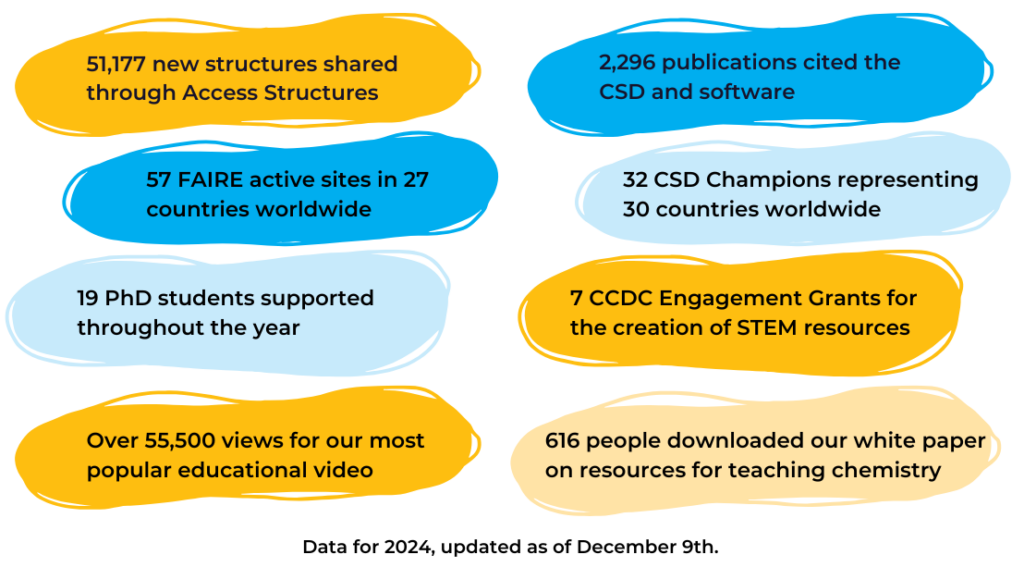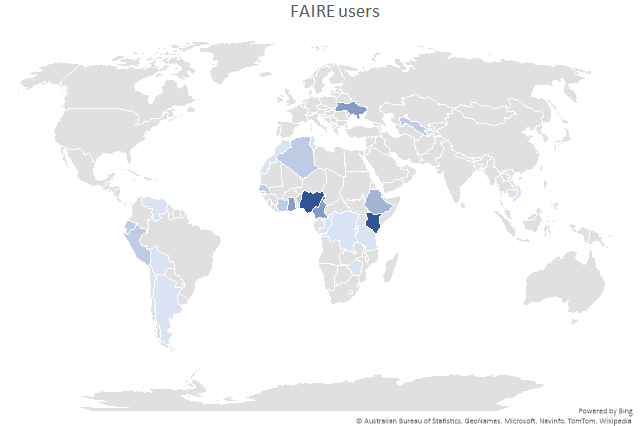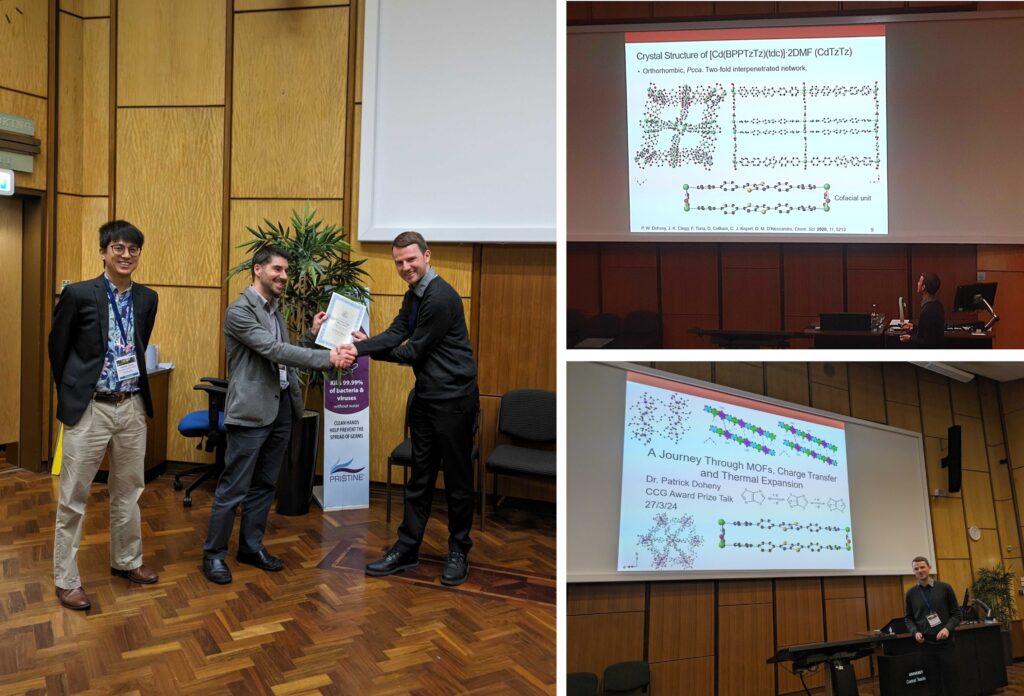The CCDC’s Impact as a Charity: A Look Back at 2024
The Cambridge Crystallographic Data Centre (CCDC) is a non-profit organization that was registered as a charity in 1987 (Charity Number 800579) by the Charity Commission for England and Wales.
Our mission is to advance chemistry and crystallography for the public benefit. We are committed to do this by providing the global community with high quality data, cutting edge software, and scientific expertise.
Here we summarize some of the ways we have supported scientists as a charity in 2024, and the impact that this had in the advancement of chemistry and crystallography.

The CCDC for the Community
CSD Data and Software
The CCDC enriches and curates the Cambridge Structural Database (CSD), the world’s largest repository of small molecule organic and metal-organic crystal structures.
A total of 51,177 new experimental crystal structures have been curated and added to the database so far in 2024 (as of the beginning of December) and are available to the public through our online Access Structure and WebCSD services.
Part of these, a total of 39,886 entries, have also been made available for the desktop CSD data portfolio through regular updates throughout the year, bringing the latest version of the CSD (Version 5.46) to over 1.3 million structures.
Within the same timeframe (January–beginning of December 2024), 81,478 CCDC Numbers have also been issued, representing the value of total collected crystal structures in this year. Each deposited structure is published in the database only once an article is published and after undergoing the full process of data curation, meaning new data will continue to become available in the CSD throughout 2025 for these structures.
The CSD represents a valuable and trusted source of experimental crystallographic data: as of beginning of December 2024, we count for this year a total of 2,296 publications where the CSD and software are cited.
The CSD Champions
The CCDC’s mission is also supported by the CSD Champions, a group of scientists, chemists, and educators across the world that help assist the scientific community in their region.
The CSD Champions are volunteers committed to share the value of structural science and help the scientific community with training, events, education activities, and by providing the CCDC with valuable feedback.
Created in 2022 with just over 20 representatives, the CSD Champions community counts today a total of 32 volunteers that represent 30 countries worldwide.
In 2024, our CSD Champions hosted, supported, or contributed to a total of 12 local training events on the use of the CSD Portfolio. One of these events was held in March 2024 by the CSD Champion Patrice Kenfack Tsobnang, who led The First Chemistry Festival of Cameroon, for which the CCDC provided financial support. The festival allowed young students and curious adults to engage with chemistry and structural science, as well as some volunteers to be trained for this purpose.
FAIRE Grants
Determined to support research in parts of the world that are in financial need, back in 2017 the CCDC established the Frank H. Allen International Research and Education (FAIRE) programme.
FAIRE grants help support research and education in underrepresented communities by covering the costs of campus-level access to Academic CSD-Enterprise for three years at universities in eligible countries.
As of December 2024, the CCDC counts a total of 57 FAIRE active sites in 27 countries across the world, an increase of over 30 active sites in the last two years. The number of eligible countries have also increased in this timeframe, going from 82 to the current 96.

Here you can access the published articles that made use of the CSD through FAIRE grants, as well as a blog that highlights work by Samuel Tetteh, FAIRE award recipient.
Explore more here on how you can use a FAIRE grant in your research.
The CCDC for Early Career Scientists
PhD Studentships
At CCDC we support PhD students as part of our commitment to education and to advance structural science in future generations.
With this in mind, every year the CCDC sponsors and co-supervises PhD students worldwide through collaborations with academia and industry, and since 2000 helped to fund over 60 PhD students.
Throughout 2024, the CCDC has supported a total of 19 PhD students at different stages of their doctorate project, providing financial support to 16 of them, and contributing with time and expertise for the remaining 3 (in kind support).
Here you can learn more about the projects of some of our PhD students.
Prizes for Early Career Scientists
The CCDC’s commitment to supporting early career scientists with international scientific awards has continued throughout 2024 by sponsoring over 10 poster and short presentations prizes at regional, national, and international Crystallographic Associations congresses.
Alongside these prizes, the CCDC has provided financial support to 10 additional events to help early career scientists attend schools and meetings worldwide. Find here our sponsorship guidelines and the form to request funding and support for educational events.
Since 2000 we have also been sponsoring the CCDC Chemical Crystallography Prize for Early Career Scientists, in collaboration with the Chemical Crystallography Group (CCG) of the British Crystallographic Association (BCA). The prize recognizes excellence in crystallographic research, and in 2024 was awarded to Dr Patrick Doheny, who presented his Prize lecture at the BCA Spring Meeting 2024.

Here you can find a list of the previous prize winners, as well as more information on other CCDC prizes.
Summer Internships
During the summer of 2024, the CCDC was also pleased to welcome two young scientists through paid internships.
Imogen Osinibi and Helen Vjestica contributed to the CCDC’s core mission by digitalizing data not yet in CIF format, laying the groundwork for making the CSD Teaching Subset more accessible, and enriching a total of 1,666 structures in the CSD.
Find out more in the blog Celebrating 5 Years of Supporting Early Career Scientists Through Paid Summer Internships.
CCDC Engagement Grants
As part of the CCDC’s mission to advance structural science for the public benefit, in 2024 we also supported education in the chemical sciences by providing 7 CCDC Engagement Grants worldwide.
The grants provide financial support to projects for the creation of engaging STEM outreach resources and activities. The resources from completed projects are then made available to the wider community, and can be used in classrooms and in science festivals (providing acknowledgments to the authors).
Find here all the information on the CCDC Engagement Grants, and discover what Leonardo Feletto, one of the previous CCDC Engagement Grants recipients, shared with us about his project and experience.
The CCDC for Learning and Teaching
Resources for Students
The CSD data and software are helpful for students of any level to visualize chemical structures in a 3-dimensional space and understand complex concepts of chemistry and X-ray crystallography.
With this in mind, throughout 2024 the CCDC:
- Continued to curate the CSD Teaching Subset, a collection of structural data of over 900 structures free to use for educational purposes;
- Produced new educational resources such as the video on glide planes, that is part of the Symmetry Operations and Symmetry Elements playlist for students;
- Contributed to the creation of RODIN, an online resource providing raw X-ray diffraction data sets from crystallography experiments for educational uses (see publication J. Chem. Educ. 2024, 101, 10, 4276–4281).

On top of this, the CCDC also provides a list of free CSD products and services that can be easily downloaded and accessed by both students and educators, and numerous free trainings and workshops demonstrating the use of the CSD Portfolio.
As of 1st December 2024, the CCDC website counts for this year a total of 2,848 unique visitors to the CSDU Modules pages, and 1,032 unique visitors to the Self-Guided Workshops pages.
Within this year, our most popular educational video Introduction to Symmetry Operations and Point Groups has gained over 55,500 views, bringing it to a total of over 148,000 views.
An outstanding number of users, over 20,700, visited our Elements in Crystals page and engaged with our interactive periodic table. Among all the elements, Californium and Oganesson are the winners for engagement from the public for this year!
Resources for Educators
To help university lecturers and professors teach and demonstrate ~40 chemistry concepts, from aromaticity to VSEPR, in 2024 the CCDC published the White Paper: Interactive 3D Chemistry Teaching Resources.
The resource provides a guide to teach core chemistry concepts like chirality, space groups, and symmetry, using interactive, 3D tools developed by the CCDC.
As of December 2024, the white paper has been downloaded by over 616 people, demonstrating how helpful computer-based resources can be to enhance the student understanding and engagement in classrooms.
On a similar note, in 2024 the CCDC also contributed to the publication of a paper that discusses a variety of resources that can be helpful for crystallographic symmetry handling and visualization, and provides several illustrative examples. The article can be accessed at the link here: Journal of Applied Crystallography, 2024, 57, 1618-1639.